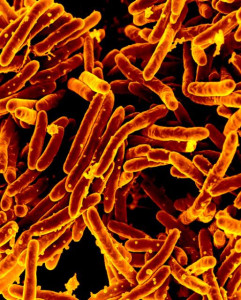by Sally PLOMLEY
sallyp@isb.ac.th
Tuberculosis (TB) is an infection caused by a bacterium Mycobacterium tuberculosis. If not treated properly, TB disease can be fatal.
In Thailand there are an estimated 80 000 new cases each year with 11 000 people dying annually from the disease.
How tuberculosis is spread?
Tuberculosis is spread when an infected person talks, breathes, coughs or sneezes tiny particles containing infectious agents into the air. These are called small particle aerosols. Due to their tiny size, small particle aerosols can travel long distances on air currents and remain suspended in the air for minutes to hours. These small particle aerosols may be breathed in by another person.
Signs and symptoms
Tuberculosis most commonly affects the lungs. In about 30% of cases the disease affects other parts of the body, such as lymph glands, bones, kidneys or brain. Initial infection of the lung usually occurs during childhood and goes unnoticed. However, a few bacteria continue to survive at the site of infection. Later in life, the infection can reactivate and a serious lung infection occurs.
Symptoms may include:
- tiredness
- fever
- night sweats
- weight loss
- cough
- blood-stained sputum (phlegm)
- chest pain
- swollen lymph glands.
Diagnosis
The diagnosis of tuberculosis is suspected on clinical presentation, chest x-ray and by a skin test (Mantoux or PPD test) or a blood test (Quantiferon test).
The diagnosis is confirmed when Mycobacterium tuberculosis is grown from sputum or other specimens.
Incubation period
Symptoms, if they occur, are present about 4 to 12 weeks after an initial lung infection. The risk of reactivation of the initial lung infection and the development of serious lung infection is greatest within the first year or two after initial infection but some risk persists for life.
Infectious period
Anyone with symptoms of tuberculosis is contagious. Because symptoms may be vague people may be contagious without knowing they are unwell. It may take several weeks of treatment before the person is no longer contagious.
Treatment
People with tuberculosis should receive anti-tuberculosis drugs under the care of an Infectious Diseases Physician. Completing a full course of therapy (of at least 6 months) is essential.
Prevention
- Exclude people with tuberculosis from childcare, preschool, school and work until treatment has been given and they have a medical certificate from an Infectious Diseases Physician stating they are no longer contagious.
- If a person is diagnosed with tuberculosis, family members and other close contacts should be tested for tuberculosis. A contact is any person who has been close enough to an infected person to be at risk of having acquired the infection from that person.
- A Bacillus Calmette–Guérin (BCG) vaccine is available. The vaccine can protect against severe forms of tuberculosis when given to young children. It does NOT prevent a person getting tuberculosis. In some countries such as Thailand this vaccine is given to all babies.
Screening for Tuberculosis at ISB
All new students at ISB must have screening tests done to show they do not have tuberculosis prior to admission to school.
The screening test done should be discussed with a doctor to determine which one is best for the student (for example with a history of BCG vaccination skin testing can give a positive result due to the vaccine). It must be either
- Mantoux (PPD) skin test
- Tuberculosis QuantiFERON Blood Test
- Chest x-ray
If the screening test that is positive the student must see an Infectious Diseases Physician and provide a medical certificate stating that the student does not have tuberculosis and is not contagious.
All returning students must do a symptom screen for TB with their annual medical examination. If there are any symptoms they must have a Tuberculosis screen done as outlined above.
All students entering Grades 3, 6 and 9 must have a Tuberculosis screening test done as outlined above unless it has been done in the preceding 12 months.
All teaching staff (or staff with direct student contact) will be required to have a Chest x-ray prior to starting work and will have a symptoms screen done every year with a screening test done every 3 years.

